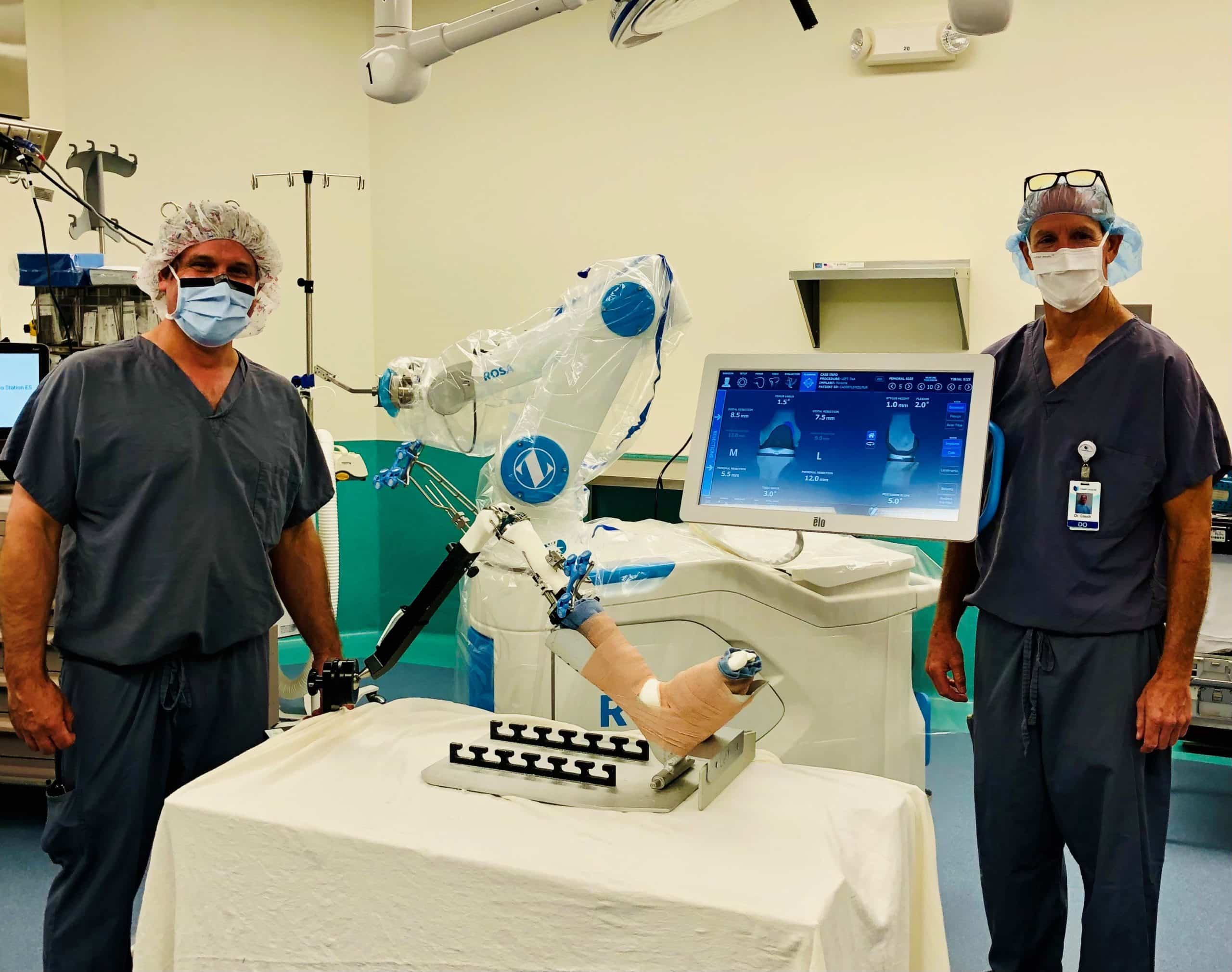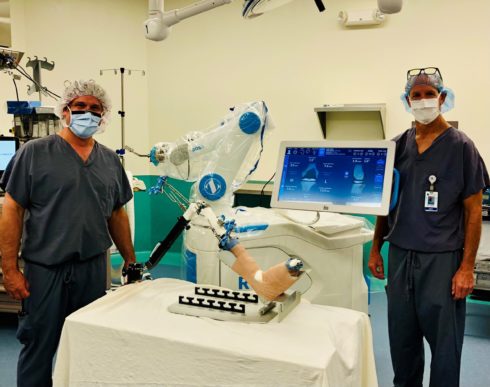Work culture makes a difference in recruitment, retention and team well-being, and all health care organizations strive to offer a more loving work environment where team members can thrive.
Vidant Health Chief Experience Officer Dr. Julie Oehlert joined the SEE YOU NOW podcast, from Johnson & Johnson and American Nurses Association, and discussed leading organizational change on Episode 64: Reporting Powers: Leading With Love.
A new, loving culture
Dr. Oehlert said “power-over” or hierarchical relationships are at the core of many relational issues, and missed opportunities in health care. She encourages all of health care to work together with team members on culture innovations.
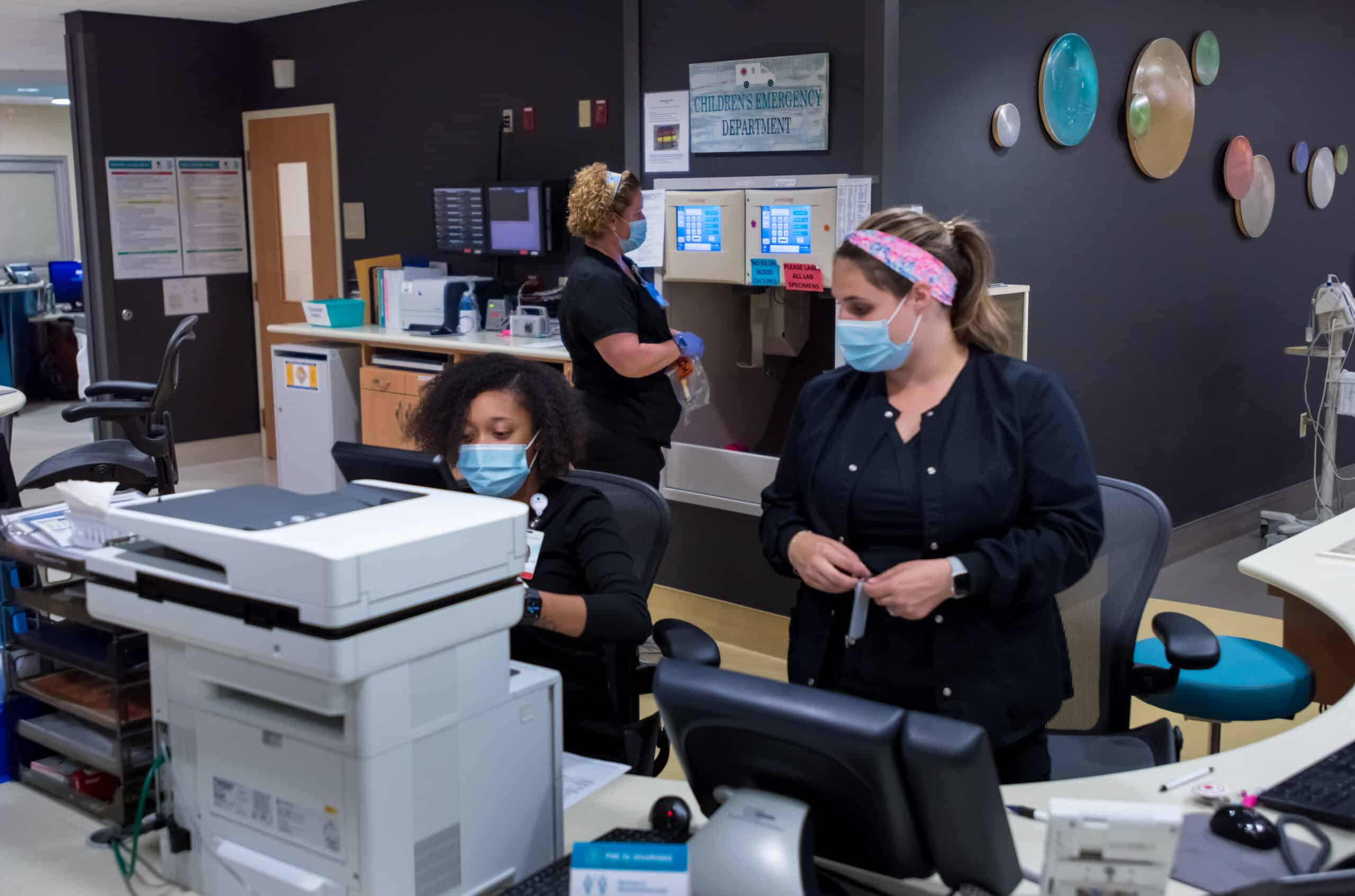
“I think most organizations use the definition of culture of ‘How we do things around here,’” Dr. Oehlert said. “That cultural definition is like you’re a fish swimming in a bowl. It is not actionable. We believe that culture is defined by how our relationships are structured with each other – how we treat each other, how we treat patients, how we treat our community, and that definition is very actionable and everyone can impact the culture.”
As team members partner to create a new, loving environment, team and organizational goals become much more achievable. Dr. Oehlert said measures such as whether team members are afraid of reporting safety events, if they feel heard by their manager, and if the community believes the health system is their partner, are key indicators of a positive, changing culture.
Dr. Oehlert noted the importance of looking to an organization’s own team members to change cultures and innovate in their own space. She believes that health care can improve if they listen to their team members who want to have a voice in their own work environment.
“You don’t need other people to help you with your culture. Do you know you have innovators sitting around in your hospital? They’re everywhere,” Dr. Oehlert said. “Your EVS and food services workers will redesign your food delivery in a hot minute. Don’t bother to pay a consultant. Your innovation awaits you if you walk into your departments. Give them an environment and ask them, listen to them and they will design beautiful things.”
It starts at the top
A culture shift in health care must include changes to leadership development. Transformational leadership is full of love, kindness and mentorship.
So, she and the Organizational Development department felt they needed to carve its own path.
“I called our chief operating officer and I had all of these books sitting around me, you know your scholarly books on leadership development,” Dr. Oehlert said. “So I’m looking at all these different models and I’m putting my head in my hands and I’m like, ‘None of these are going to take us where we want to go. We’re going to have to develop our own leadership curriculum and our own leadership framework.’”
A team came together and different and new frameworks were pulled together to create a unique system for Vidant to develop talented team members and grow leaders.
This new system was necessary to transform and later maintain a culture of love, empathy and power-with attitudes from organizational leaders.
“Leadership development is so important because the leaders are at the top of the hierarchy; if they are perpetuating fear or dominance, whether intentional or not, because some leaders were just taught to lead that way, that has to shift,” Dr. Oehlert said. “A new leadership way of being has to emerge.”
Policies reflect culture
Policies are a reflection of the workplace culture and policies can frequently be outdated and not in line with the culture of the organization.
Dr. Oehlert said as the culture shifted, the organization needed to review policies and procedures.
“It’s amazing how many policies, once you read them with a lens of caring and love that you realize – ‘This is terrible. Why would we have this policy?’” Dr. Oehlert said. “Are your policies by their nature punitive? How do you handle mistakes and coaching and errors with your team members? Do you have grace when they are humanly failing? Do you have grace for their mental health issues? You really have to dismantle that.”
Looking for more?
Find and listen to the SEE YOU NOW podcast, Episode 64. Reporting Powers: Leading with Love, wherever you get your podcasts.
Read more on Dr. Oehlert’s previous appearance on the SEE YOU NOW podcast.
As the nation honors the memory of Rev. Dr. Martin Luther King Jr., Vidant Health team members took a moment to reflect on what it means to care for others through the impactful work they do each day to improve the health and well-being of eastern North Carolina.
Advanced Heart Failure & Mechanical Circulatory Support Social Worker Terrani Moore has assisted patients at Vidant Health for nearly 10 years. “I enjoy people—that is one of the biggest things that drove me to this profession and being able to care for people,” Moore said. “I love having the opportunity to make meaningful changes in their lives and not only for me to make the changes but to empower them to make changes.”
Vanessa Polk, a chaplain with Pastoral Care at ECU Health Medical Center, shares this sentiment. “Each day I have an opportunity to be with individuals at their most vulnerable moments –from the birth a child to a poor prognosis to a family crisis to coping with the impact of the pandemic to the end-of-life of a love one,” Polk said. “What I find most meaningful about what I do is that it allows me to offer others sacred attentiveness that communicates to them that I care and they are safe with me.”
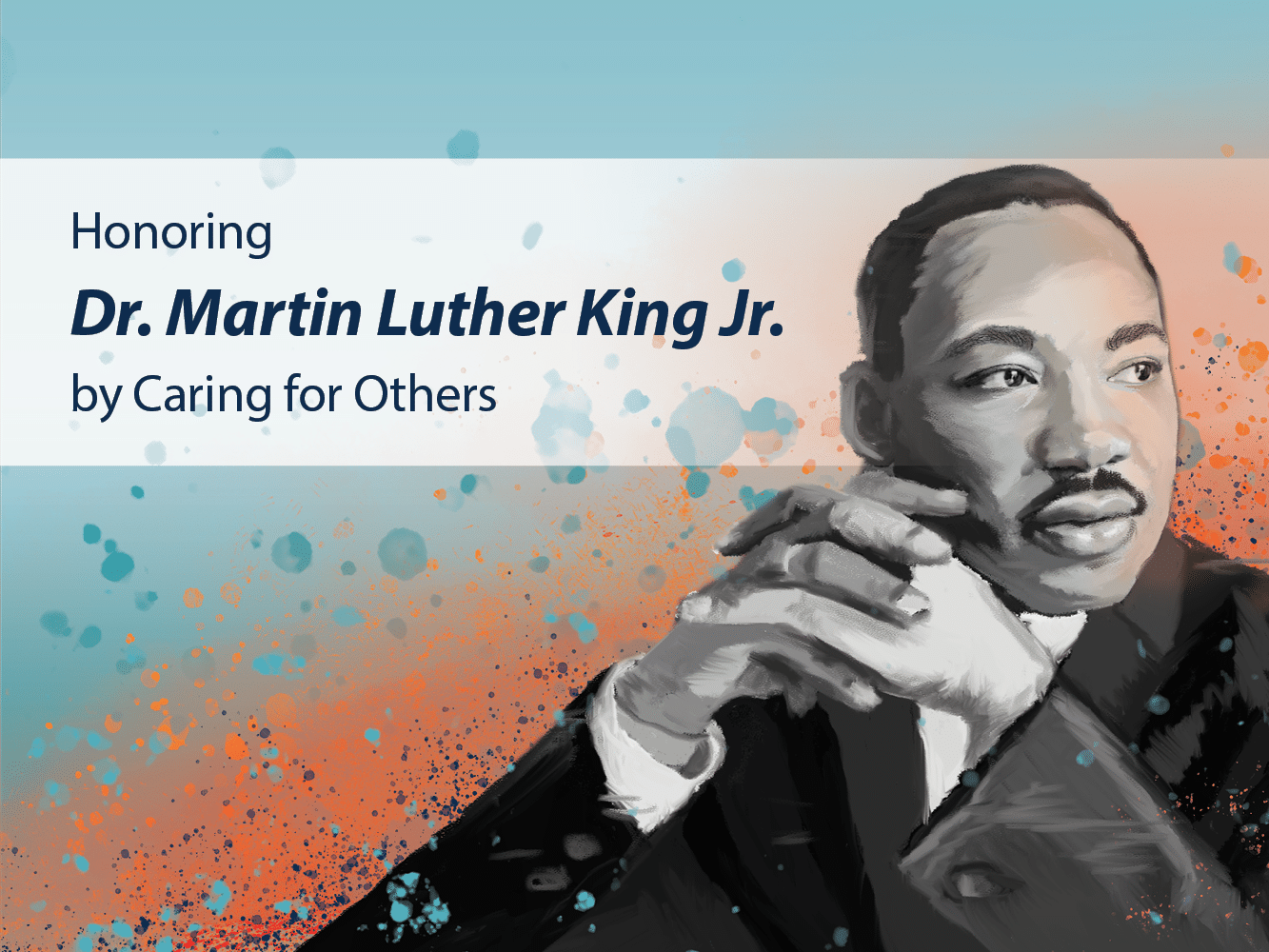
Jannette Nelson, an Experience greeter at Vidant Health Maynard Children’s Hospital, understands the importance of making sure patients, who she refers to as “her angels,” are comfortable during each visit. “My motto is love what you do, treat others as they wish to be treated and always remember your name goes further than you do, and it’s up to you the way you want it to go,” Nelson said. “You have to have compassion and that’s why I say treat others as you wish to be treated. If that were my child—what would I do? If it were me, what would I want someone else to do?”
Rev. Dr. King once said, “Life’s most persistent and urgent question is, ‘What are you doing for others?’” It’s a question that resonates among those who have chosen health care as a profession—especially as COVID-19 continues to affect the industry in countless ways.
“I am very blessed to work with a team that all of us have a heart for people for our patients and the community around us,” said Moore. “We are able to help patients but if we see others in need outside our building, we offer a helping hand, a listening ear.”
Gratitude for one another—and the inspiration that comes along with watching fellow team members support others—also provides deep meaning for Chaplain Polk.
“During the early stages of the pandemic when we were trying to figure out innovative means to provide spiritual care for patients who had restricted physical access to their loved ones, [my colleague] Father Gaston never wavered,” Polk said.
“Whenever I became overwhelmed by the impact COVID-19 was having on our patients and team members, Father Gaston’s expressions of faith and words of wisdom strengthened me and drew me back onto the path of my purpose. Without dismissing the reality of human experiences, Gaston has a special way of helping others to find peace and fortitude within the distress of their uncertainties.”
On this day of honor and remembrance of Dr. Martin Luther King, Jr. and the legacy he leaves behind, we find meaning in the important work Chaplain Polk, Janette Nelson, Terrani Moore and other Vidant Health team members do in support of eastern North Carolina.
Thank you for what you do today and every day in service to eastern North Carolina.
Greenville, N.C. – Jan. 3, 2022 – The joint operating agreement between East Carolina University’s Brody School of Medicine and Vidant Health is now officially underway, enabling the organizations to create ECU Health and work together to improve health care delivery to the 1.4 million residents of eastern North Carolina.
Under the joint operating agreement, the Brody School of Medicine and Vidant Health will remain separate legal entities, but will integrate under a new, shared brand known as ECU Health. The ECU Health logo will be revealed in the spring and the rebranding process for most Vidant entities and ECU Physicians practices will begin shortly after. Rebranding is expected to take months to complete.
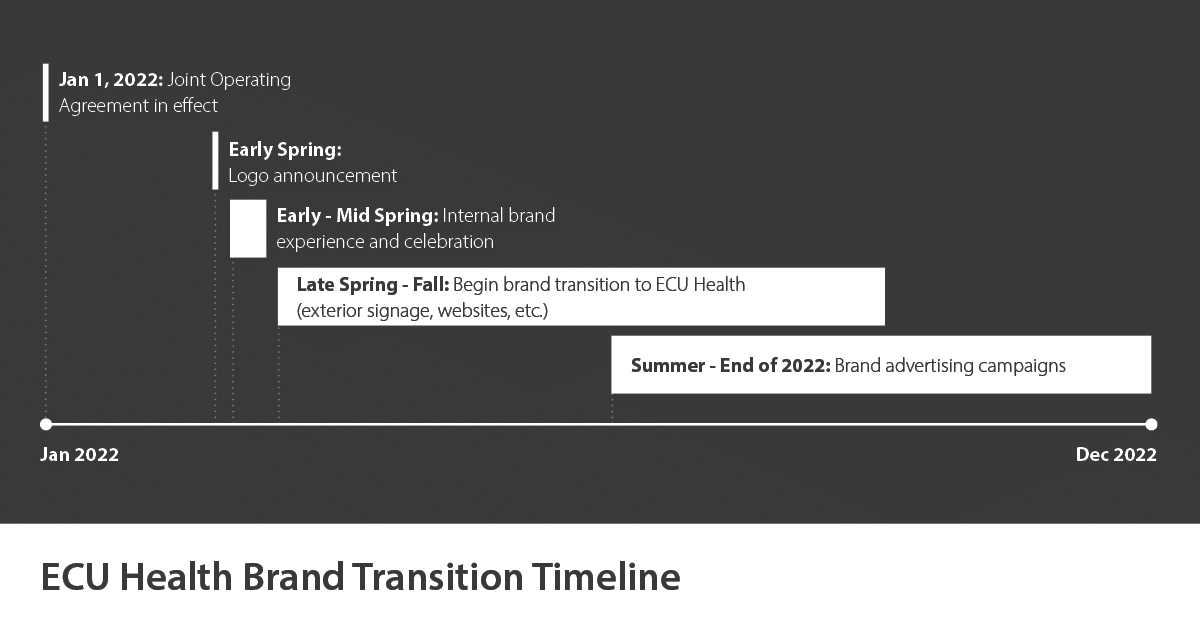
“The new year marks an important and exciting chapter for health care in eastern North Carolina,” said Dr. Michael Waldrum, CEO of Vidant Health and dean of the Brody School of Medicine. “2022 will be a year of transformation for Vidant and Brody as we create ECU Health and position ourselves as the national academic model for providing rural health care. Together as one, ECU Health will have profoundly positive impacts on the health and well-being of those we serve.”
The two organizations are working together to:
- Evaluate and modify existing practices to improve quality and coordination of care.
- Integrate certain management structures and strategic planning efforts.
- Develop a plan for shared services to support the integrated entity.
- Leverage the capabilities of each organization to advance the collective research and education infrastructure.
- Coordinate philanthropic initiatives.
The joint operating agreement received board approvals in November and became official on Jan. 1, 2022. The agreement provides a structure that allows the two organizations to more effectively and efficiently address current issues facing the region – such as health disparities and care delivery obstacles – while also better anticipating future health care and educational needs.
“The close partnership between Brody and Vidant created a strong foundation upon which to build ECU Health,” said Dr. Jason Higginson, executive dean of Brody. “The ability to combine academic excellence with high-quality, state-of-the-art health care delivery will elevate care, research and education opportunities available to the people of eastern North Carolina. We look forward to continuing to work together and introduce ECU Health to the community later this year.”
Greenville, NC – Dec. 29, 2021 – As Vidant Health continues to respond to the evolving COVID-19 pandemic and the increasing spread of the Omicron variant, we are taking steps to ensure the safety of all. In consultation with infectious disease experts and based on current trends, Vidant is proactively updating visitor guidelines for the health system and adjusting the reopening of the Wellness Center – Greenville.
Vidant continues to strongly encourage masking, vaccinations and boosters, as we all work together to combat COVID-19.
Visitor Guidelines
Effective 8 a.m., Thursday, Dec. 30, Vidant will update its visitor guidelines across the system, including restricted visitation and a new requirement that all visitors wear a hospital-issued mask. Cloth masks will no longer be permitted. Visitors should also be mindful of Vidant’s new screening process and are encouraged to visit VidantHealth.com/checkin to register prior to their visit.

This is an evolving situation and Vidant continues to monitor the spread and examine local data, including COVID-19 cases in our region and in hospitals, and will adjust visitation restrictions accordingly.
For the latest information on Vidant’s visitor restrictions, please visit VidantHealth.com/VisitingVidant.
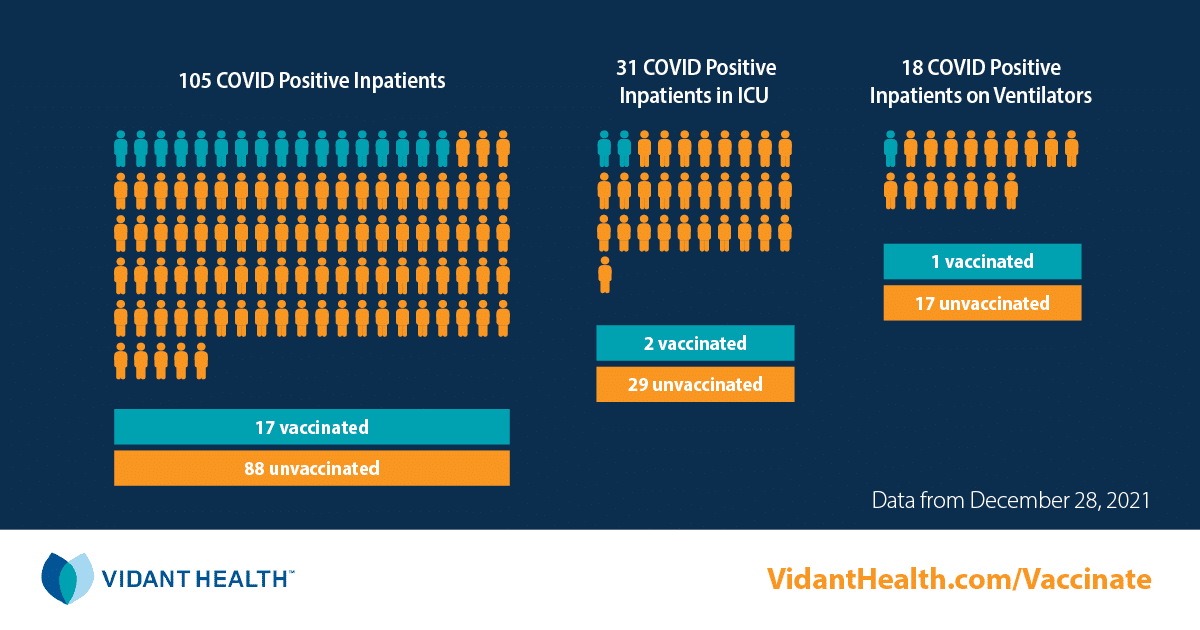
Wellness Center – Greenville
Originally scheduled to fully reopen on Jan. 1, the Greenville Wellness Center will open with limited services only starting on Jan. 1, such as personal training, private lessons, fitness orientations and tours. The fitness center, indoor track and pool will remain closed for general membership for the time being. Community members signed up to become members of the Greenville Wellness Center will receive additional details directly from the Wellness Center.
Vidant leadership, with guidance from our infectious disease experts, will continue to review the COVID data and spread throughout the coming weeks to determine a date for a full reopening.
The Wellness Centers in Ahoskie and Washington will continue their current operations.
All Vidant Wellness facilities will follow stringent COVID protocols for the safety of all including required masking for all members, visitors and staff, effective Dec. 29.
For more information, please visit https://www.ecuhealth.org/services/wellness-prevention/vidant-wellness-centers/#covid-19-update
Vidant Health continually reinvests dollars back into the health system to fulfill our mission of improving the health and well-being of eastern North Carolina. With a focus on team member and patient experience, we reinvest in our care environments, including technology and unit aesthetics throughout the health system every year.
The Renal Dialysis Unit (RDU) at ECU Health Medical Center (VMC) moved to a new, reconstructed space on 1 East with upgraded amenities, more space and increased privacy for patients.
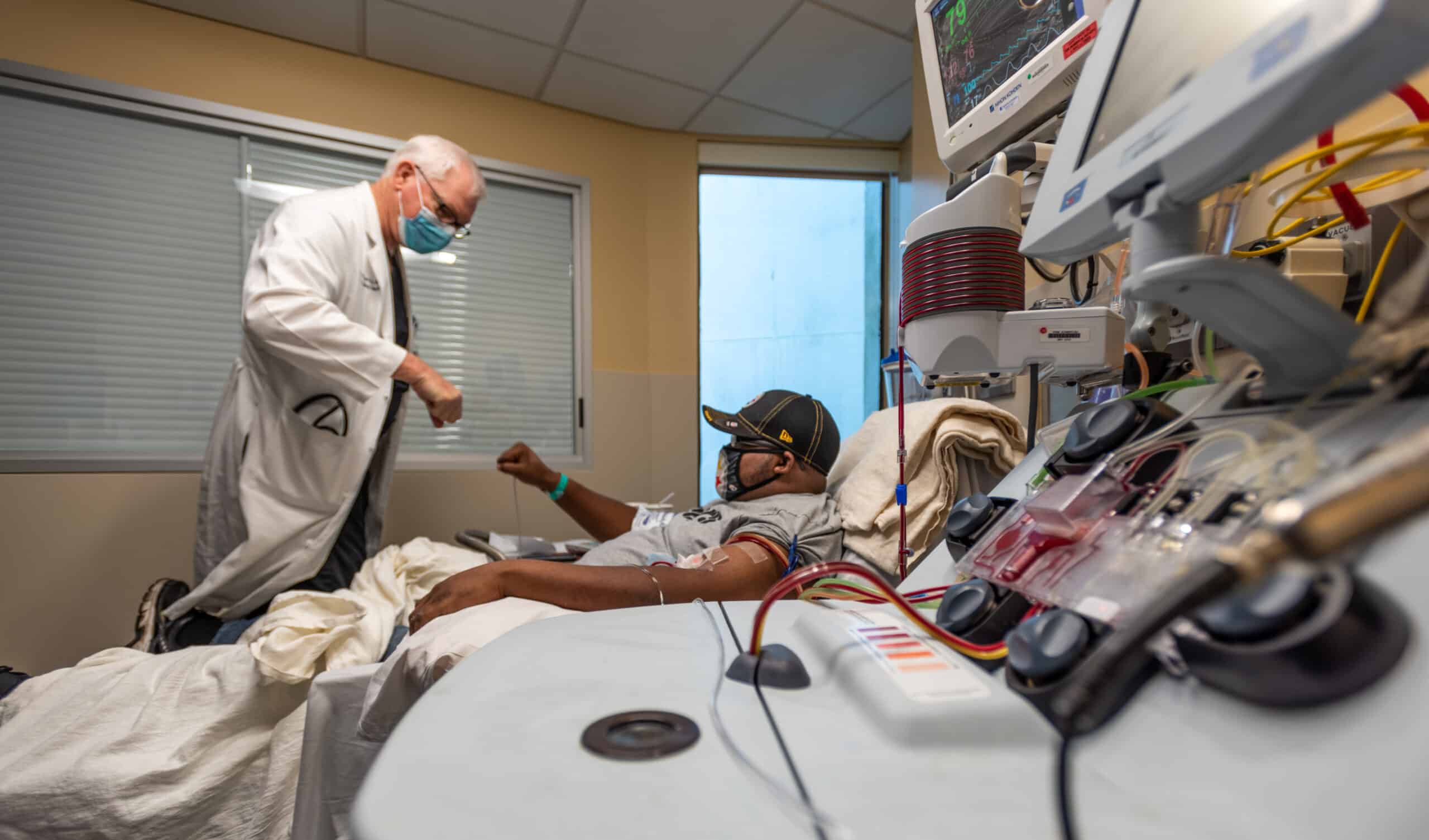
The RDU provides numerous treatments for patients including hemodialysis, peritoneal dialysis and apheresis. Laura Respess, manager of Patient Care Services, said hemodialysis (or the removal of waste from the blood) involves two venipunctures if the patient has a graft or fistula, or by accessing the central line, and then hooking the patient to a dialysis machine. Blood is pulled out a little at a time, goes through the dialyzer to remove toxins and/or fluid and is then returned to the patient. Intensive treatments such as hemodialysis mean that patients spend a lot of time in the hospital, and the new RDU offers a more peaceful and private experience for patients while receiving treatment.
The new space on the first floor offers easier accessibility for patients due to location, and improved patient flow with an increased bay count from 12 to 20. Additional amenities such as TVs in each bay offer patients a welcome distraction from treatment.
This upgraded unit has received glowing reviews from patients, providers and the RDU care team in the short time it has been open. Patients have praised the larger bays with TVs and privacy, while providers have been excited about new machines and the presence of windows that provide brightness in the space.
“The team experience is enhanced because we are all on one floor (previously it was split on two floors). There is plenty of storage space, and everything is new, clean and inviting,” Respess said.
By reinvesting back into the system, we are improving the quality of care for patients, and enhancing experiences for patients and team members. As we look toward our future as Vidant Health, the care and services provided, such as renal dialysis treatments, will have even greater impact for those we proudly serve.
Vidant Chief Experience Officer Julie Oehlert talks about nursing innovations on SEE YOU NOW podcast
Vidant Health Chief Experience Officer Dr. Julie Oehlert took time recently to discuss the Vidant system, nursing and innovation on the podcast series SEE YOU NOW.
Johnson & Johnson and the American Nurses Association launched SEE YOU NOW, a storytelling podcast that highlights innovative and human-centered solutions driven by nurses. The podcast addresses today’s most challenging health care problems.
Changing a culture
During her time on the podcast, Dr. Oehlert reflected on the importance of a positive culture in health care and how a strong culture can lead to improved patient and team member experience. When she first arrived at Vidant, she noticed the organization’s culture had room for improvement—including a shift from a “power-over” to a “power-with.” Dr. Oehlert said she focused most of the work in her first two or three years in the system on team members, love, empathy and bringing those elements into relationships so that a new, loving culture could emerge.
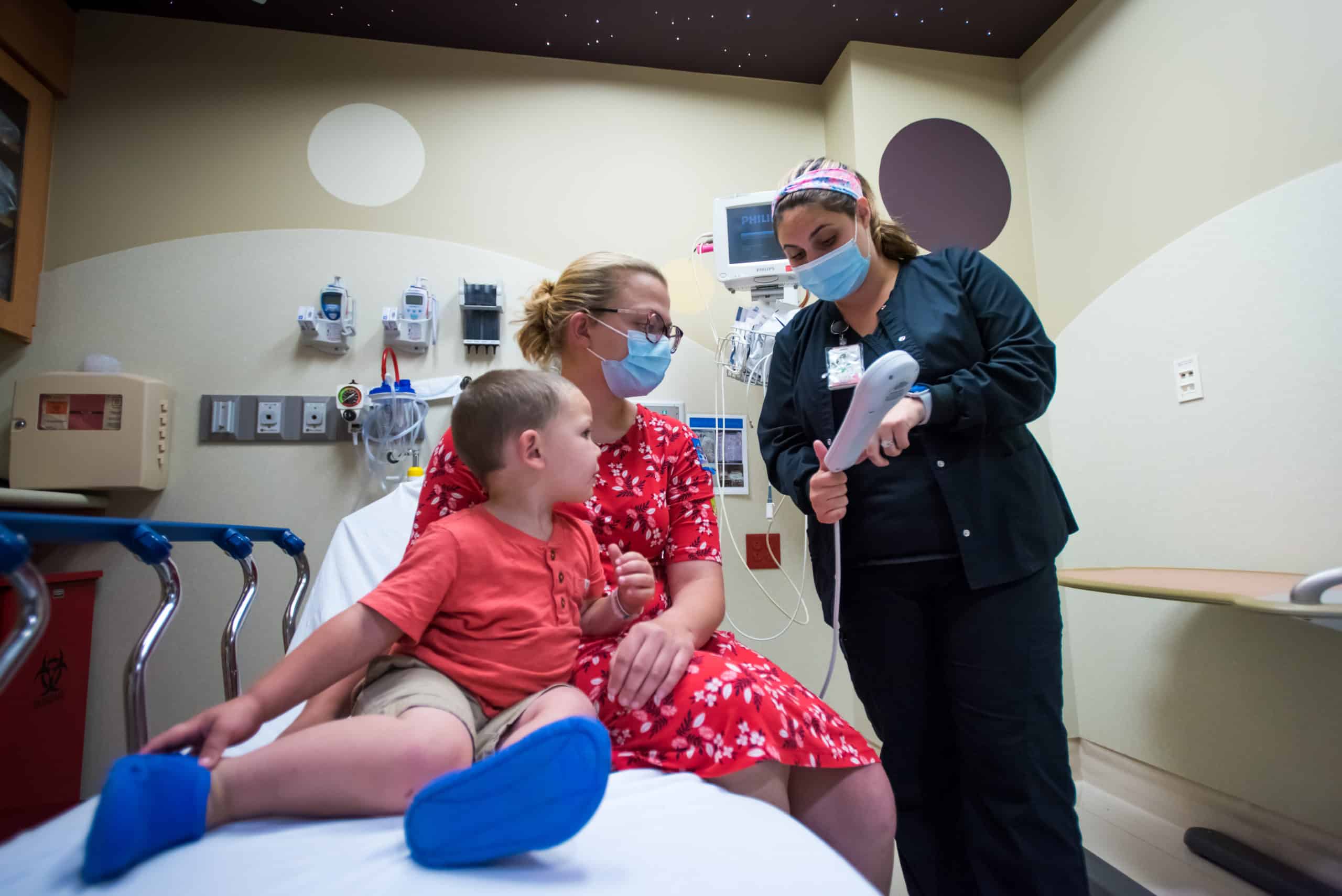
“It’s very clear in the science that one type of culture begets certain things and another type of culture doesn’t,” Dr. Oehlert said. “So in a power-with culture, you get a lot of innovation, empathy and compassion. You usually have good mentorship, good talent management, you have shared decision making, great patient experiences, good quality outcomes and people aren’t afraid to report near misses. That culture will deliver results that everyone in health care wants.”
As this desired culture became a reality at Vidant, it built a foundation for resilience in the eight-hospital health system and the more than 13,000 team members. Resilience is necessary at all times in health care to face the various daily challenges, especially in rural health care. But as a pandemic closed in, its importance was magnified.
Delivering health care in rural areas
Dr. Oehlert said delivering health care in rural areas is a challenge Vidant faces every day. The communities Vidant serves face many of the same problems other rural health systems see, along with its own unique challenges.
“People can’t get places, people don’t have access to things that they need or want. Anywhere where there are rural environments, in those kind of forgotten places anywhere in the world, these challenges would be the same,” Dr. Oehlert said. “When you’re in an urban environment, you’re 10 minutes from a resource. Here, you could be an hour and a half from a resource. That brings with it a lot of really interesting possible solutions.”
One of those solutions for Vidant is keeping resources out in the communities that need them. With regional hospital and clinic locations, she said Vidant can keep care and resources as close to home as possible for patients and families throughout a 29-county service area.
Adapting in a crisis
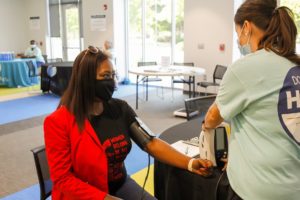 The COVID-19 pandemic has made the need for care and resources close to home much more important. Dr. Oehlert said a key innovation since the onset of the pandemic has been clinic pop-ups throughout eastern North Carolina.
The COVID-19 pandemic has made the need for care and resources close to home much more important. Dr. Oehlert said a key innovation since the onset of the pandemic has been clinic pop-ups throughout eastern North Carolina.
These community health events bring crucial services, screenings and resources to areas that need them. Talent recruitment is another important service provided during these community events.
“We always bring a recruitment person. So we actually give people jobs, which is what our communities’ want, so we hire right out of these community events,” Dr. Oehlert said. “Then as soon as our entry-level workers get here, we say, ‘What else would you like to be? What else would you dream of doing?’ We do a lot of really relational recruitment right from our low-trust communities.”
Giving team members the room and resources to grow through various programs, like the HomeGrown program, is one way Vidant makes an effort to invest in its team members.
Innovating together
COVID-19 has changed the typical way of doing business across all industries, and health care is no different. Innovation often is born during crisis and desperation and Dr. Oehlert said that while health care is changing and innovating rapidly, advice from a mentor gives her comfort.
“Teddie Potter used to say very kindly to me when things were very chaotic, ‘Julie, sometimes things have to disassemble before they reassemble.’ That gives me some peace because health care is disassembling, but it’s only disassembling so we can reassemble it in a much better, more loving, more caring way that is exactly where we need to head for health care to be what we need it to be for our future,” Dr. Oehlert said.
Dr. Oehlert said while health care moves forward, it will be crucial to keep nurses involved in discussions around innovation because of their unique perspective and connection to the patients they serve.
“They can do it with love and empathy and joy and hope as well as having the technical and scientific expertise,” Dr. Oehlert said. “That’s the beauty of nursing, it’s a heart job but it’s a science job.”
Looking for more?
Find and listen to the SEE YOU NOW podcast, Episode 61. Reporting Powers: Insights in Action wherever you get your podcasts.
Greenville, N.C. – Dec. 3, 2021 – Vidant Health has implemented a new screening process for visitors at Vidant Health hospitals to ensure enhanced safety for all patients, visitors and team members. In partnership with care.ai, a health care Artificial Intelligence (AI) innovator, the new technology allows visitors to complete a convenient contact-free visitor safety screenings before visiting loved ones.
“Throughout the COVID-19 pandemic, the safety of patients, visitors and team members has remained a top priority,” said Lou Montana-Rhodes, Vice President, Office of Experience, Vidant Health. “This unprecedented time requires thoughtful innovations that help protect those we love and serve. The new Smart Entry™ screening solution developed by care.ai will allow us to work more efficiently and effectively at creating the safest environment possible at all Vidant hospitals.”
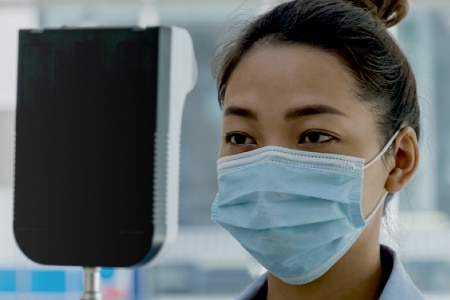
Visitors will complete their symptom screenings at VidantHealth.com/checkin, which will provide a QR code on their smart phone device. care.ai’s Smart Entry™ sensors will scan the QR code upon arrival and capture temperature readings in real-time. care.ai’s command center alerts team members to abnormal events as they occur to prevent visitors that may be positive for potential infection from entering.
Once the visitor is cleared for entry, a single day visitor pass is generated. Visitors must complete this process each day they visit. This provides a safe and efficient way to support visitor and patient access, while ensuring everyone entering the facility has been properly screened.
Team members will be on-site to assist visitors with the new screening process. Any visitors that may not have a smartphone to complete the screening process before entering will be able to with the support of team members upon arrival.
“We’re committed to making sure the patients and clients we serve have the information they need to keep them as safe as possible,” said Chakri Toleti, founder and CEO of care.ai. “We’re grateful of our partnership with Vidant Health and have such admiration for the role they play in triaging and controlling this pandemic and are proud to team up with them in this shared fight against COVID-19.”
GREENVILLE, N.C. (Nov. 12, 2021) – Today, East Carolina University’s Brody School of Medicine and Vidant Health took the first step in the final approval process in creating ECU Health with a goal of becoming a national academic model for providing rural health care.
ECU’s Board of Trustees approved a joint operating agreement between the Brody School of Medicine and Vidant Health that will enable the two organizations to more effectively and efficiently address current issues facing the region — such as health disparities and care delivery obstacles — while also better anticipating future health care and educational needs.
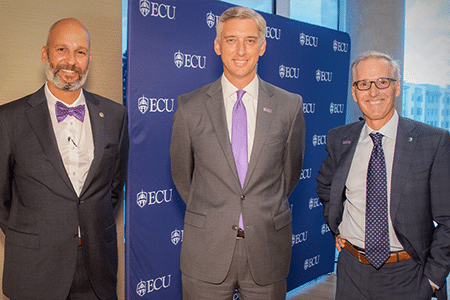
Under the joint operating agreement, the Brody School of Medicine and Vidant Health will retain their separate legal entities, but will function collaboratively under a new, shared brand launching in 2022, known as ECU Health. Most Vidant entities and ECU Physicians will operate under the new brand while the Brody School of Medicine’s name will not change.
“This agreement represents an important milestone in the long-standing affiliation between two entities bound by the same mission as we work toward the creation of ECU Health,” Chancellor Philip Rogers said. “It signals the point where we can begin to move forward together on our journey to launch a clinically integrated academic health system and deliver on the commitment to provide quality health care for all eastern North Carolinians.”
The agreement also requires approvals from the Vidant Health Board of Directors, ECU Health Medical Center Board of Trustees, the Pitt County Board of Commissioners, and the University of North Carolina Board of Governors. The UNC Board of Governors is expected to consider the agreement for final approval during its Nov. 17-18 meeting.
The majority of Vidant Health’s locations, ECU Health Physicians and ECU Physicians will rebrand to ECU Health. However, there are no changes to the employment status or benefits of current employees – and no assets are exchanged – as a result of the approval of the joint operating agreement.
ECU and Vidant Health announced their intentions to clinically integrate in June when Dr. Michael Waldrum, chief executive officer of Vidant Health and distinguished professor at the Brody School of Medicine, was appointed dean of the Brody School of Medicine. Waldrum continues to serve as CEO of Vidant Health in a dual role that is further outlined by the joint operating agreement.
“Today’s announcement is about the residents of eastern North Carolina and brings into reality the collective vision our two institutions have shared for nearly 50 years,” Waldrum said. “Rebranding Vidant to ECU Health in 2022 further signals and strengthens our commitment to bring the best research, doctors and care to the East. We have proven in recent years, and particularly during the pandemic, what can be accomplished when we focus our energies on the mission to improve the health of eastern North Carolina.”
The joint operating agreement is a legal framework that will allow the work of clinical integration and rebranding to begin in earnest with the purpose of:
- Improving the value of and the access to quality care and providing patients with a more streamlined health care experience.
- More efficiently using clinical staff across the combined operations, regardless of which organization employs them.
- Helping to facilitate new strategies and interventions for the most prevalent health needs of eastern North Carolina.
- Creating operational efficiencies and reducing costs.
- Establishing a shared leadership and governance structure for ECU Health.
Under the terms of the agreement, which will be effective Jan. 1, 2022, the two organizations will work together to:
- Evaluate and modify existing practices to improve quality and coordination of care.
- Integrate certain management structures and strategic planning efforts.
- Develop a plan for shared services to support the integrated entity.
- Leverage the capabilities of each organization to advance the collective research and education infrastructure.
- Coordinate philanthropic initiatives.
“Our mission has not and will not change. How we execute the mission is what is at issue,” said Dr. Jason Higginson, executive dean of the Brody School of Medicine. “We are going to be looking at areas where efficiencies can be built into our process and where value can be added to what we’re doing to improve the final outcome. So rest assured, what Brody is here for and what it stands for is not changing.”
Waldrum noted that the Brody School of Medicine has a rich history of training physicians for North Carolina and that mission will continue as ECU Health serves the 1.4 million residents of eastern North Carolina.
“Through harmonizing our operations wherever possible and building on our unique expertise in caring for rural and underserved communities, ECU Health will set the standard and be a national model for rural health care delivery,” Waldrum said.
About Vidant Health
Vidant Health is a mission-driven, 1,708-bed academic health system serving a region of more than 1.4 million people in 29 eastern North Carolina counties. The not-for-profit system is made up of more than 13,000 team members, nine hospitals including an academic medical center, home health, hospice, wellness centers, and ECU Health Physicians, a multi-specialty physician and provider group with more than 500 providers in more than 100 practice sites in eastern North Carolina. Vidant is affiliated with The Brody School of Medicine at East Carolina University. As the largest employer in the East and a major resource for health services and education, Vidant’s mission is to improve the health and well-being of eastern North Carolina. For more information, visit VidantHealth.com.
About East Carolina University
East Carolina University, or ECU as it’s best known, offers 87 bachelor’s, 68 master’s and 18 doctoral degrees to 28,000 students on its Greenville, North Carolina, campus and through an acclaimed online learning program. ECU also boasts the largest business school enrollment and largest number of new nurses and education professionals produced by a four-year North Carolina university, in addition to the largest studio art program in the state. Located near Atlantic coast harbors where pirates once roamed, ECU adopted the “Pirates” mascot in 1934 for its athletics program and competes in NCAA Division 1. Visit: www.ecu.edu.
The Brody School of Medicine at East Carolina University was founded more than 40 years ago to increase the supply of primary care physicians serving North Carolina, improve the health status of eastern North Carolina and enhance access of minority and disadvantaged students to a medical education. Each year, the school graduates close to 86 medical students and welcomes about 125 residents and fellows. Brody consistently ranks No. 1 in North Carolina – and in the top 10% nationally – for graduating physicians who practice in-state, practice primary care and practice in rural and underserved areas. It also ranks in the top 10% nationally for graduating Black and Native American physicians.
Each year on Veterans Day, Vidant Health honors and thanks the nation’s military veterans for their bravery and service for our country.
This year, ECU Health Medical Center (VMC) hosted a Veterans Day celebration on Wednesday, Nov. 10, to honor the nearly 500 veterans, in addition to the hundreds of military and veteran family members and those currently serving in a Reserve or Guard capacity, who are Vidant team members. Team members who have served in all branches of the military attended the event at VMC, which began with the Pledge of Allegiance.
Reverend Raynard Griffin of Vidant’s pastoral team led attendees in prayer to reflect on their service. Van Smith, executive vice president at VMC, thanked team members for their service and for their hard work and dedication to caring for the community.
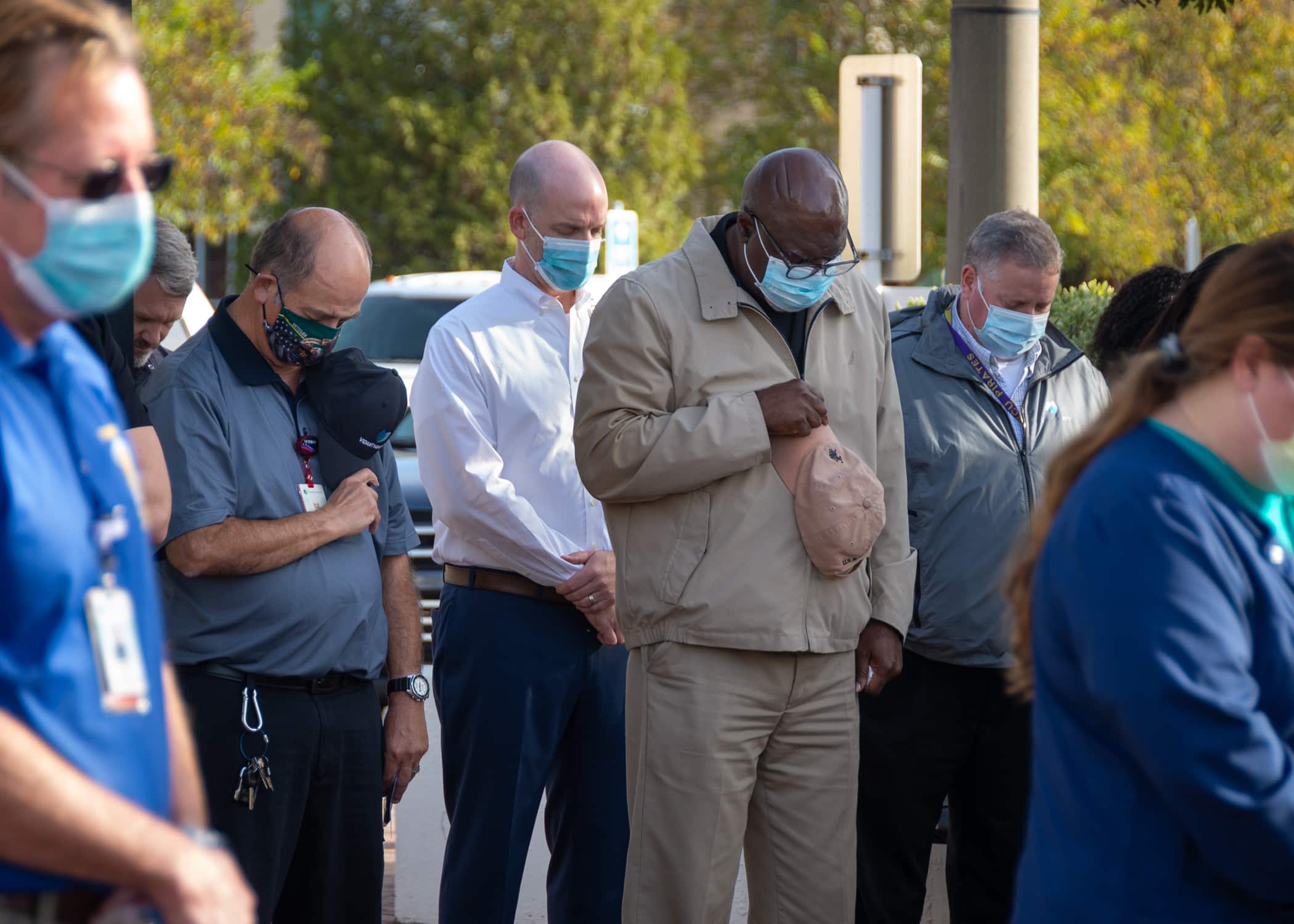
“Military service requires a commitment that is beyond the ability and comprehension of many,” said Smith. “In times of peace, and especially in times of war, it necessitates an allegiance to something greater than oneself. Here at ECU Health Medical Center, we’re also called to a common purpose as stated in our mission statement: to improve the health and well-being of eastern North Carolina. In our veteran colleagues that we have here and that are serving right now throughout ECU Health Medical Center and all across Vidant Health, we are fortunate to have people who know what it means to make a commitment like that. They’ve done it.”
Proud Air Force veteran now CVIU Staff Nurse at VMC
 Among the 500 military veterans who now serve as Vidant team members is Audrey “Lee” Webb.
Among the 500 military veterans who now serve as Vidant team members is Audrey “Lee” Webb.
Born and raised in Windsor, North Carolina, Webb comes from a long line of family members who served in the military. Both her father and brother retired from the United States Army, while she was the first in her family to enlist and serve in the United States Air Force.
During her eight years in the Air Force, Lee traveled the world. She was stationed in Virginia, South Korea, Germany and Oklahoma. It was during her time in South Korea, that she picked up the nickname “Lee,” and it stuck with her ever since. Lee also served during Desert Shield in Saudi Arabia, and when her unit first arrived in the country, she was one of two women in a group of 67 men.
While enlisted, Lee worked in Non-Destructive Inspections (NDI). NDI personnel identify possible defects in systems and equipment. Wear, tear and fatigue occur in metals without visible signs. Similar to employing x-rays to visualize internal body parts, NDI personnel use non-invasive methods to inspect the insides of metal objects.
One of her most memorable times was being awarded the “Below the Zone.” Below the Zone is a competitive early promotion program that offers exceptional Air Force members the opportunity to earn their next rank six months early. Members are nominated by their chain of command and undergo a rigorous interview process to go over their major accomplishments and attributes. Lee was one of two Air Force members who earned Below the Zone in her unit.
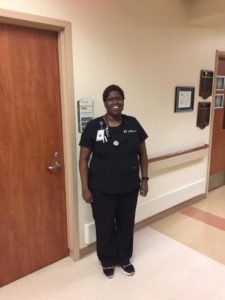
After being honorably discharged from the Air Force as a Sergeant (E-4) in 1995, Lee came back to eastern North Carolina to use her GI bill to attend nursing school at Pitt Community College. Right out of college, she was hired at Vidant (previously Pitt Memorial Hospital). She has worked as a nurse at VMC for over 20 years now, currently serving as a Staff Nurse III on CVIU.
When asked how her military training has helped with her current career, she replied, “I am used to team building and teamwork. In the Air Force, we were mission-focused, and we are mission-focused in health care, as well.”
Lee said, “Traveling and serving in third-world countries and seeing the conditions there, really makes you appreciate what we have here. I am proud to have served our country. I love America!”
This Veterans Day – and every day – we are grateful to Vidant team members who served our nation and now serve eastern North Carolina. We are Vidant Proud of their commitment and dedication to improving the health and well-being of those around them. Please join us in thanking these heroes for all they do, for all of us. Watch a recap of the celebration at VMC below.
Greenville, N.C. – Nov. 2, 2021– Vidant Orthopedics has a new way to keep community members moving thanks to a new robotic knee surgery technology called the ROSA® Knee System offered at Vidant Beaufort Hospital, a campus of ECU Health Medical Center, and ECU Health SurgiCenter in Greenville.
Though recovery times will vary, most patients should be able to drive after two weeks, garden after three to four weeks and golf after six to eight weeks. The ROSA® Knee System is a robotic surgical assistant for total knee replacement. This new technology allows the surgeon to create a plan for the procedure using a 3D model of the patient’s knee, establishing a more precise view and a more customized approach for the patient’s joint anatomy.
“It is important to provide the latest in technologies to our patients and provide them with more options for their care,” said Dr. Deanna Boyette, chief of orthopedics, Vidant Orthopedics. “Along with this new knee replacement technology for in-patient needs, there is also the option to perform ROSA surgery on an outpatient basis, depending upon the individual needs of the patient.”
There have been seven ROSA surgeries performed at ECU Health SurgiCenter in its first week with six more scheduled in the near future.
“The orthopedic surgeons are still performing the knee replacement surgeries, and with the ROSA® Knee System, we can dial in the precision of our knee replacements to levels that meet the individual needs of the patient,” said Dr. Christopher Hasty, orthopedic surgeon at ECU Health SurgiCenter. “This technology allows us to provide the patient with the best knee replacement with maximum results with quick recovery time. Most patients are back to their regular activities within a couple of weeks.”
This total knee replacement technology supports patient care and offers advanced technology in the community so patients do not have to travel long distances to receive this procedure. The team of highly-trained orthopedic surgeons at Vidant Orthopedics is equipped with latest technologies, treatments and surgical techniques and can now perform these surgeries for patients who want to stay close to home.
The need for total knee replacement surgery results when other treatment options no longer provide relief. Unlike traditional total knee replacement methods, prior to surgery, the ROSA Knee takes a series of X-rays that can be used to create a 3D model of a patient’s knee anatomy. This 3D model enables the surgeon to plan the procedure according to the patient’s unique anatomy.
During surgery, ROSA Knee utilizes a camera and optical trackers attached to a patient’s leg to know exactly where the knee is in space. This helps ensure the plan the surgeon put into place is performed as intended. The ROSA Knee functions as an assistant to the surgeon providing the surgeon with data about the knee and helping in the precise positioning of the implant.

